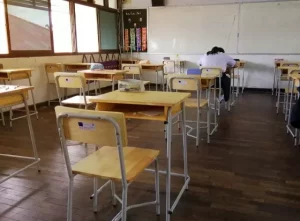If you dropped your class, you have come to the right place. Dropping from class is one of the most stressful and nerve-wracking experiences a college student can have, but there are many reasons for it.
Alternatives exist, and we are here to help you skip the stress and find the perfect class for you. Sometimes people drop a class accidentally, or they failed to like it. Either way, you might be thinking: what happens next?
Whether you are just starting college or have been around for a long time, this post has alternatives you can take if you drop a class.
Reasons you Might have Dropped from Class
Here are a few:
1. You do not Like the Professor
Maybe the professor never shows up for a class or speaks in a language you cannot understand. Also, maybe, the professor teaches at a speed that is too fast for you to follow, or he grades assignments too harshly.

It may be the case of a bad college professor or something else. Whatever the reason, it is important to talk to your advisor about your concerns.
Your advisor may help you find an alternative course, or he helps you learn how to overcome some of these obstacles on your own.
2. Your Class Schedule is too Heavy
If you are taking a heavy load of courses, then it is not uncommon to find yourself struggling with one of them.
While dropping a course can help ease the burden and allow you more time to focus on other subjects, it can also take away valuable credit hours and require you to pay back financial aid money if you are not aware of these rules.
It is best to check with your advisor before dropping any course so that one can review your course schedule and make sure it is right for you.
3. Absenteeism
If you stop attending a class, it may lead to being withdrawn administratively. Students should officially drop or withdraw from classes they do not plan to attend.

If you missed a lot of classes, your teacher may contact your parent/guardian, who in turn contact your counselor.
If this happens, contact your counselor and ask for help putting together a plan to work with your teacher to make up the work that you missed.
You may need to attend tutoring or an after-school program to get things caught up.
4. Failure to Submit Assignments
If you are not turning in assignments, it is possible that you are overwhelmed by the amount of work. Talk with your teacher about getting a list of all missing assignments so that you can create a plan to complete them on time.
You may need to attend tutoring or an after-school program for extra help with getting caught up. Every time excuses will make you drop from class.
How to Get back to Class after Dropping
There are a million reasons why someone would drop out of college. Here is how to get back on track:
Talk to Your Professor about Dropping the Class
First, you need to talk with your professor about dropping the class. Let the instructor know that you want to continue with the coursework.
Talk to your professor or instructor about your options and how withdrawing from the class affected your coursework. The way the professor responds may help you decide if you want to take this class again or not.
If your professor or instructor approves, then meet with an academic advisor in your college or major department to see if there are any other options for completing the class and make sure dropping won’t negatively impact your academic standing or graduation date.
If there are no other options, then get permission from your advisor to drop the class.
Seek Motivation
Some students who drop out of college do so because they feel unprepared or overwhelmed. Before making a final decision, talk with your academic adviser or mentor about ways you can improve your academic performance.
They may help you identify specific areas in which you are struggling and offer suggestions on how you can do better in those areas.
If your motivation is lacking, spend some time talking with classmates or other students who complete their degree program each semester. Ask them how they get pumped up for schoolwork and what motivates them to stay committed to their education.
Better Alternatives Instead of Dropping
1. Defer the course
One way to avoid dropping out is to defer the course. If you take the course over again, it will help refresh your memory and give you another chance at passing it.
This method is effective because it helps you to avoid having to repeat the whole year if you fail one course, and gives you a better opportunity to learn and study more efficiently, as well as maintain your focus on the material taught in class.
It is better to defer the course until later when you can do better work or have more time to devote to completing the course requirements. You have up to one year to complete a deferred course.
If you do not take the deferred course within one year, it might be removed from your academic record without further notification depending on the university policies.
2. Take Part-time
If you feel like you are falling behind in your classes or not able to keep up with the pace of your college coursework, consider taking some time off while still attending school part-time.
This is a smart way to buy yourself some time without setting yourself back years in terms of completing your degree.
A part-time load will give you time to work a part-time job and keep up with your college coursework. If you need to make more money than a part-time job can provide, consider getting an on-campus job or working in the evening while attending classes during the day.
3. Take Online Classes
Look into academic support programs.

They could be online sites like Chegg or CourseHero, which provide academic support services, designed to help students get back on track when they start falling behind.
These might include tutoring programs, study groups, workshops on how to manage time, or other resources that can help you improve.
Contact your school’s student services department for more information about the academic support programs available at your college or university.
4. Change Courses
If you find yourself struggling in your coursework, then it is time to consider whether your major is right for you.
You may do the work, but it does not challenge you enough or excite you enough to keep trying. If you are finding that you lose interest in the subject area, then it is time to look at switching majors.
5. Get Homework help Services
The best part of homework services providers is they are available online and you can access them from anywhere across the world. It is also evident that most of these homework service providers have highly qualified tutors who will systematically assist you with your problems.
These tutors are well-versed and knowledgeable in their respective fields. They will ensure that the solution you get for your problem is simple and easy to understand.
6. Take Fewer Units
Sometimes, the best alternative to dropping out of college is to learn how to balance your time more effectively. If you are struggling with your workload, consider taking fewer classes during the semester.
Improve study skills as you take fewer units at a time since handling many can overwhelm you. This can help you learn strategies for taking notes, reading textbooks, and preparing for exams.

Joseph is a freelance journalist and a part-time writer with a particular interest in the gig economy. He writes about schooling, college life, and changing trends in education. When not writing, Joseph is hiking or playing chess.
